| MH Rowe |
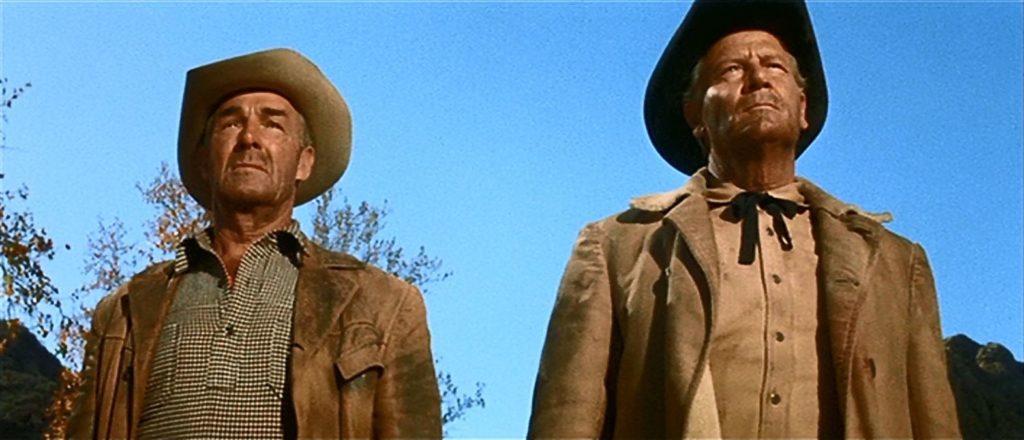
Ride the High Country and The Ballad of Cable Hogue play at the Trylon Cinema from Friday, May 19 through Sunday, May 21. Visit trylon.org for tickets and more information.
The most important thing in a Sam Peckinpah western is the automobile. Cars are the essential metaphor, at least when it comes to his crudely grand and murderous epic The Wild Bunch (1969), but also when you consider his first classic film Ride the High Country (1962)—Terrence Rafferty calls it the “last of the great classical westerns”1—and his loose, high-spirited western fable, The Ballad of Cable Hogue (1970). In each of these films, a car materializes for a short time as a specter haunting Peckinpah’s heroes from the future. Like any specter worth the name, it can reach out and touch you—probably kill you.
Peckinpah’s cars foreshadow a newly destructive century: industrial but casual and even arrogant with the stupefying power of its user-friendly inventions. If “inventions are the work of Satan,” as a preacher tells his congregation in the background of one comical set piece in The Ballad of Cable Hogue, it’s because everyone refuses to see the danger. Everyone thinks they’re safe now in a conquered West, but it’s an age of onrushing disaster, a time when civilization won’t need a “frontier” to stage any of its atrocities. That’s the key to Peckinpah’s cars, in my humble opinion; they portend the cheapness and calamity that are particular to industrial progress. As the ending of The Wild Bunch shows, anyone can be a monster with a Browning machine gun.2
The timelines match up, too. All three of these films, without making it particularly obvious—except, I suppose, The Wild Bunch—and while otherwise indulging in all the trappings of the Hollywood western, do not take place in thenineteenth century at all. In their early twentieth century settings, the last aging lawmen, killers, and desert rats find that not only is there no country for old men, there is no time for them, either. These are westerns of people living on belatedly in a world that is too late for both their wildest and most modest dreams. Decent folk have overrun the frontier. The “days of the steady businessman” have come round at last, as a banker tells Steven Judd (Joel McCrea) in Ride the High Country. You can feel that Peckinpah wants to be nostalgic for a more primeval era, but he’s frank enough to tell tales, adventures really, that suggest instead the bleakness of the world decent people have made and want to live in.3
In its opening scenes, Ride the High Country distinguishes itself from the “classical westerns” to which Rafferty compared it. We know immediately that we are in a western where westerns are dying or dead. As the aging Judd, McCrea—a veteran actor who’d starred almost exclusively in western films for nearly 20 years by 1962—arrives on horseback in a bustling town. He grins and tips his hat at the crowds lined up along the street, goofily mistaking their jeers and enthusiasm for a personal welcome. A police officer quickly shouts him out of the way: A camel is racing some horses for everyone’s entertainment, and Judd has to clear the road. This is one sign that the western is over, the carnival atmosphere in an untroubled town. The multiple policemen are another. There’s no lone sheriff here. The streets are safe and highly administered. There’s more law here, an excess. It’s an impatient cop who calls Judd “old timer” and prevents him from being smashed flat by a passing car, the brief and bland intrusion of the deadly Peckinpah automobile in Ride the High Country. Electric wires are strung above the buildings.
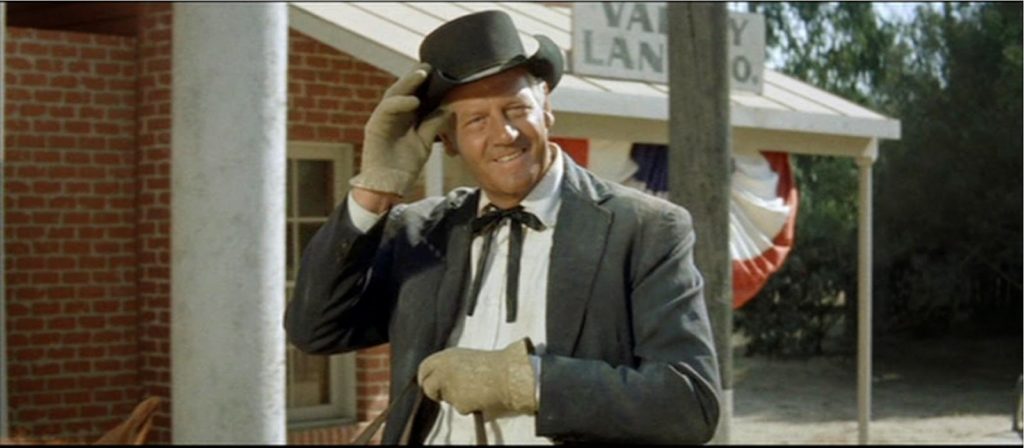
A final sign of the dead western is the carnival itself. Judd comes to a central square where exhibits have been set up. In a large booth, a man dressed as the “legendary” Oregon Kid, wearing a ludicrous, stagey costume, hosts a shooting game. He mocks and teases his customers, challenging them to outshoot him. They can’t, of course, because this fake is the real thing. The game’s MC, in his false mustache and wig, is none other than Gil Westrum, played by Randolph Scott, who just like Joel McCrea had starred only in westerns since the late 1940s.
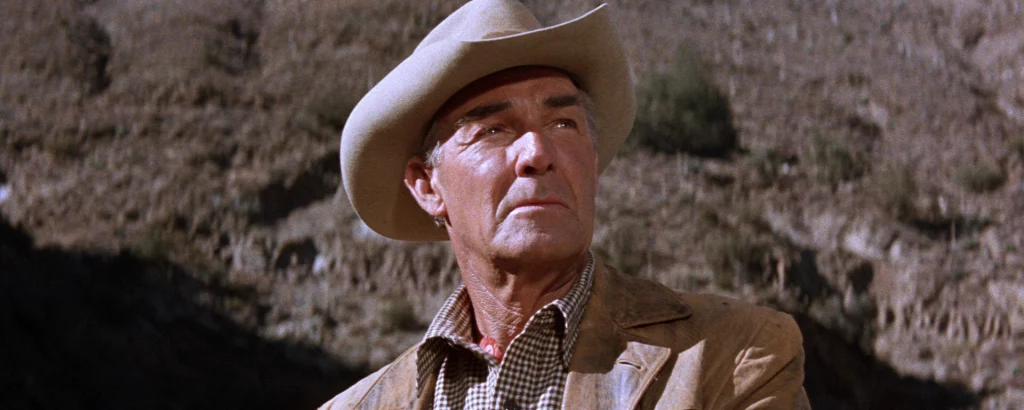
Whoever did the casting for Ride the High Country pulled off a real coup. It’s like putting two guys who’ve played Batman in a movie about how nobody gives a shit about Batman anymore. If you have any interest in the “heroic” classics of the western genre, watch McCrea in director Jacques Tourneur’s lyrical Stars in My Crown (1950) or his wry, earnest Wichita (1955)—affecting sentinels of mid-century politics, for better and worse—and watch Randolph Scott in any of the so-called “Ranown Cycle” directed by Budd Boetticher, though I’d particularly recommend Seven Men from Now (1956), Ride Lonesome (1959), or The Tall T (1957), which may be the most narratively efficient films of all time. In Ride the High Country, when McCrea as Judd, the ex-sheriff, confronts Scott as his ex-deputy Westrum, who’s dressed up as the Oregon Kid, their dialogue has all the meta-commentary you could want. Defending his getup, Westrum says, “You got to allow for a little exaggeration—that’s part of playing this game.” He calls Judd’s number, too: “Looks to me like you’ve been riding a long time but not getting anywhere.” It could almost be a joke. In fact, it is a joke. Two exhausted western personas walk into a bar…
The upshot is that Judd offers Westrum a real job, a western job. It may be a gig as a “bank guard,” ferrying money from a remote mining town back to civilization for investment in the local bank, but Westrum’s face lights up. Little does Judd know what we soon learn: Westrum, with the help of his young partner, the perfectly named Heck Longtree (Ron Starr), plans to steal the money, with or without Judd, though he wants to convince his old boss to get in on the score. Judd will latter prove to have been more suspicious of Westrum than he let on.
Whatever moral authority McCrea projected in films like Wichita, it’s turned merely—should one say “merely”?—to professional dignity here. Then there’s Scott, who managed a wonderful element of menace in a film like Seven Men from Now but turns in front of Peckinpah’s camera to amused cheekiness and guile. His is a great, low-key comic performance; look out for his amusing line reading of the word “no.” As an entry in the well-established genre of the “one last job” film, Ride the High Country brings to bear the history of the western but also two careers it defined. You couldn’t get the same effect with a bright shining star like John Wayne. McCrea and Scott were certainly stars—and rich men—but they have the saving air of journeyman character actors. These men are not quite icons, though God knows Randolph Scott’s mountain crag of a face should be.
On their way to the mining town of Coarsegold (real giveaway of a name, thematically speaking), Judd, Westrum, and Longtree pass through a farm where Elsa Knudsen (Mariette Hartley) lives alone with her widowed father. She is bright, eager, and independent, while her father spouts Bible verses and rails against a godless world of gold-loving sinners. The film knows his fundamentalism is foolish in principle, but the depiction of Coarsegold will only confirm his vision of a depraved world ruled by money and drink. Elsa and Heck take a liking to each other immediately, of course. She’s due to marry a man in Coarsegold, though, and has to run away from home and catch up with our protagonists on the trail after they have left the farm and moved up into the mountains. Judd and Westrum reluctantly agree to take her on, as the team rides through beautiful sequences of landscape cinematography.
While Scott’s performance in Ride the High Country is a comical one, he plays Gil Westrum as fundamentally angrier than McCrea’s Judd. It’s Westrum who first voices the conflict between them, when, in an attempt to take Judd’s temperature on his gold-stealing plans, he expresses his sadness over the fact that, as ex-lawmen, no one ever showed them the gratitude they deserved for making the west safe. In other words, he wants the money he feels any reasonable man could be owed for a job well done. Decent people owe them an unpaid debt.
Their time in Coarsegold bends their world out of shape but ultimately back into it. The man Elsa’s promised to marry turns out to be a crude thug. He plans to share her with his boorish, creepy brothers. They’re idiot-monsters, rapists. In Coarsegold, the carnival atmosphere from the town where the film opened continues, but here a perverse carnival nighttime has fallen. Elsa’s wedding scene is hellish, with a drunk judge and no friends except her bridegroom’s leering brothers. A madame from the local brothel seems a laughing parody of a true friend. In these scenes, Elsa descends into something awful, saved at the last moment by Heck and, roused to action, Judd himself, who with a gun and a righteous attitude pulls Elsa out. Their consciences pricked at last, they can’t let her stay on in this shameless purgatory.
How the film finishes from here on out is perhaps its most conventional part, in terms of plot. The final duel is not as interesting as the relationship between Westrum and Judd, who has in the end a Biblical sense of self-worth, adapting a line from the Gospel of Luke as a pronouncement on his own character: “All I want is to enter my house justified.” Before this notion, Westrum can only quail or shake his head, despite his own role in the rescue of Elsa. When he finally sees the light, so to speak, Judd tells him, “You just forgot it for a little while, that’s all.”
Although the finale of Ride the High Country has its emotional satisfactions, it still sounds a bleak note. For all the renewed sense of moral purpose and the complex confrontation between old friends, Judd and Westrum’s sense of duty hinges on a mundane transfer of gold over the mountains. Not just any gold, either. They carry the hard-won earnings of the miners in the town from which they had to forcibly rescue Elsa. The people there are not threatened by outside forces or launching attacks of their own. No war touches them. They live in peace and a little bit of squalor. But they also hosted one of the most diabolical weddings I’ve ever seen on film. Their saloon is a Dionysian nightmare. Their judge possesses a legal license but is a true sham and tippling fool. Everyone’s good time depends on the suffering of another. This is the world Elsa’s father feared. While the beginning of the film suggested silly crowds, presumptuous policemen, and accelerating cheapness, Coarsegold offers the crass and wanton violence of everyday life in a time of prosperity. Both towns exist in a world where, above all, cars and money must be free to get to the places they need to go. In the end, Judd and Westrum believe there’s something to be ashamed of; hardly anyone else in the film does, not counting, for hopefully obvious reasons, Elsa’s rigid father.
The towns of the warmer and more absurd The Ballad of Cable Hogue—one is called Dead Dog, the other Gila or sometimes Lizard—are not quite so hellish as Coarsegold, but Cable Hogue (Jason Robards) wants little to do with them anyway. Abandoned with no water in the desert, Hogue stumbles around for days before running across a spring on the road between the two desert communities. It’s here, after the excellent monologue and editing of the credits sequence, that Hogue and Peckinpah’s film set up camp.
Hogue himself is a warm, expressive mixture of the enterprising and the foolish, the decent and the exploitive. No one could deny his basic sense of capitalism. He puts a fence around a natural resource to sell it in units for as much as he can. When he talks to God and complains about his fate, the most convincing objection he raises and the most assertive plea he makes is simply to say his own name: “Hogue! Me!” Although he’s not exactly upright—he serves his first customers at gunpoint, killing the first one in, more or less, self-defense—Hogue’s adventures bring him close to all sorts of decent people in a way that justifies his pronouncement later in the film, “Good people? [In] Dead Dog? I never met any.”
He has, in fact, met at least two. First is a kindly banker, who almost lovingly gives the destitute Hogue a loan of $100. At wits end, Hogue had pleaded with him, “I’m worth something, aren’t I?” The complex look of gratitude on Robards’s face when he realizes the banker agrees is enough to make you believe money isn’t the root of all evil.
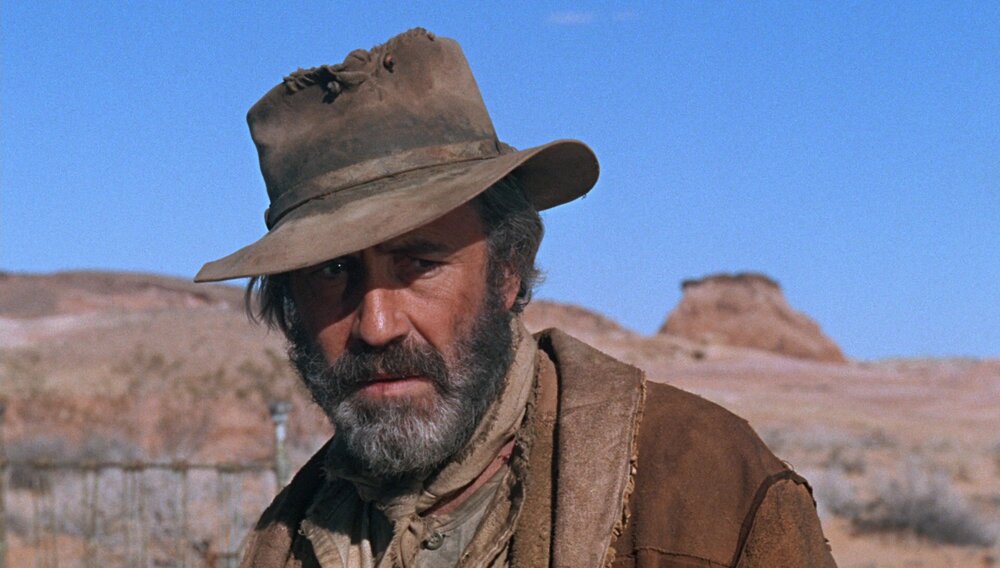
The second decent person Hogue meets is the love of his life, Hildy (Stella Stevens), an entrepreneurial prostitute who manages to survive the camera’s ogling long enough to be the film’s other fascinating character. Her plan to marry the two richest men in San Francisco—“it’s just a question of time”—appears completely plausible in the high-spirited Hogue universe. She also gets to do some excellent slapstick, a boon for any actor in a parable of the decent and destitute against an encroaching wave of the unfeeling and well-to-do. As Hogue tells Hildy when she asks him if her way of life ever bothered him, since they’re lovers, “What the hell are ya? Human being.” Peckinpah at his most humanistic—maybe most romantic. Like so many purveyors of violence on the silver screen, he has a distinct sentimental streak. When Hogue says about his discovery of the spring in the desert, “Found it where it wasn’t,” he might as well be talking about society at large.
A much more ambiguous figure in the film is Reverend Sloane (David Warner), whose antics seem to be intended as comical in the style of a raunchy teen sex farce, something like Animal House or Revenge of the Nerds. Instead, he comes across as a sexual predator, pure and simple. It’s nevertheless Sloane’s little poetic sermons that connect Hogue with the urban shadow of the twentieth century. When he surveys the setup at Cable Springs, he envisions and predicts “busy thoroughfares,” “alabaster buildings,” and a community of the “faithful.” Given Sloane’s penchant for carrying around naked pictures of women he calls his “parishioners” (a term he also tends to use for women he seduces or assaults), it’s not that hard to imagine he’s seeing a glistening, seedy metropolis. It makes sense that the prophet of such a place would be a hypocritical man of god and a creep to boot. Yet as with Elsa’s father in Ride the High Country, Peckinpah sees something true in his vision at the very least.
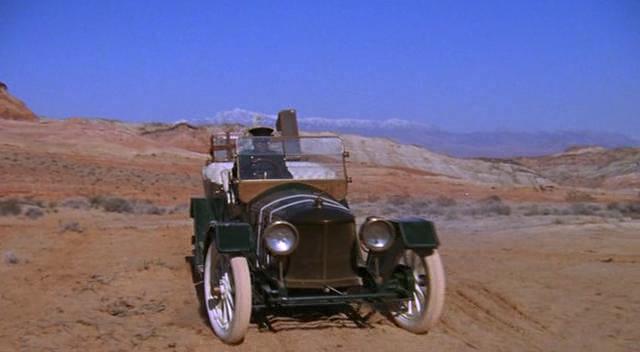
Hogue himself wants nothing to do with that future. After finally getting a chance at revenge against the men who left abandoned him in the desert, he leaves one of them, Bowen (Strother Martin) the station he founded. The more immediate reason for his decision is Hildy’s return to the desert. Rich now, she has a chauffeur, and her chauffeur drives a beautiful car, a Thomas Flyer. It’s not only the return of Hildy, though, that decides Hogue. It’s the car itself.
The first car Hogue sees goes right on by without stopping, an avatar of accelerating time. “Don’t look that good to me,” he says defiantly, but he and the viewer know instantly that Cable Station is finished. It’s not a waypoint when people don’t need to stop. His place has become nowhere again. However, after a brief argument with Bowen about how the car runs, it seems clear that Hogue may be responsible for the invention of the gas station. He just won’t be the man to run it. To the extent that The Ballad of Cable Hogue has a heart-warming edge, it works best in this mode of refusal, with Hogue ducking the future that’s coming, whether he wants to or not. As in a folk tale, Hogue has a “one-man kingdom” he must leave behind, in the most splendidly absurd manner possible—and all because of a car. Like Steven Judd and Gil Westrum, Cable Hogue appears to be a man out of time, and it’s best if all three of them stop before the appalling wonders of the twentieth century get any closer.
NOTES
1 Terrence Rafferty, “The Shock of the Old: Seven Men from Now and the Ranown Cycle,” Criterion.com, August 6, 2021. https://www.criterion.com/current/posts/7487-the-shock-of-the-old-seven-men-from-now-and-the-ranown-cycle
2 The famous massacre with a Browning machine gun at the end of The Wild Bunch feels like a distinct precursor to the dilemma of RoboCop, where the whole point is to be a man with a gun, not a gun with the remainder of a man attached to it as an element in its proper functioning. Insofar as The Wild Bunch perceives something in the twentieth century, it sees the agency and fearsome power of the tool of death itself, which needs any old operator, not a particular individual, to make it work.
3 For a melancholy reprisal of similar material, a world where the only future is “law and order,” see Peckinpah’s often beautiful Pat Garrett & Billy the Kid (1972), with its immortally good riverside death scene starring Katy Jurado and Slim Pickens to the tune of Bob Dylan’s “Knockin’ on Heaven’s Door,” a song written for the scene. Jurado and Pickens convey an entire marriage in one wordless exchange.
Edited by Olga Tchepikova-Treon
